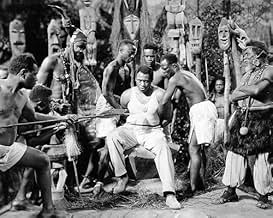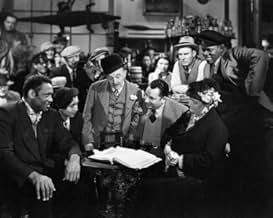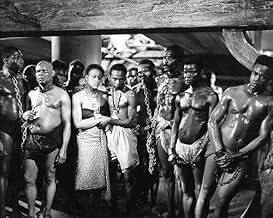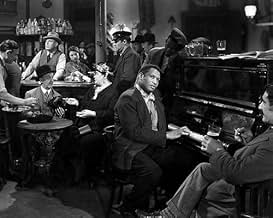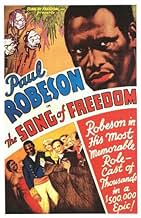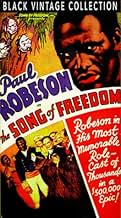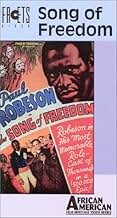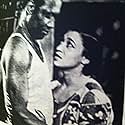AVALIAÇÃO DA IMDb
6,4/10
458
SUA AVALIAÇÃO
Adicionar um enredo no seu idiomaA black British dockworker named Johnny Zinga becomes a famous singer and learns that he is the rightful king of the African island of Casanga.A black British dockworker named Johnny Zinga becomes a famous singer and learns that he is the rightful king of the African island of Casanga.A black British dockworker named Johnny Zinga becomes a famous singer and learns that he is the rightful king of the African island of Casanga.
- Direção
- Roteiristas
- Artistas
Elisabeth Welch
- Ruth Zinga
- (as Elizabeth Welch)
Bernard Ansell
- Sir James Pyrie
- (as Bernerd Ansell)
Cornelia Smith
- Queen Zinga
- (as Miss C. Smith)
Sydney Benson
- Gate-Keeper
- (não creditado)
Cathleen Cavanagh
- Woman
- (não creditado)
Alf Goddard
- Alf, the Bartender
- (não creditado)
Avaliações em destaque
This Hammer Studio, from London, England which is famous for its horror films surprised me with this great film from 1936 starring Paul Robeson, (John Zinga) who works as a London dock worker and sings songs all the time besides having a great bass voice for the opera and is discovered by a great opera director and producer from London, England. John is always wanting to go to Africa where he came from, but he does not know exactly where he was born, but he still remembers a song which he heard when he was very young. One day John happens to sing this song on stage in an opera performance and this song is recognized by an Englishman who tells him where it comes from and also a charm which John wears around his neck which helped determine its origin. John also has a wife and they both visit this Island and try to introduce themselves to these people and that is when the story gets very interesting. Don't miss this great film from the past, it is a gem in the rough. Enjoy
This was a fairly good film dating back to 1936 from Hammer Productions in Britain. Starring Paul Robeson, whose extraordinary vocal talents are properly utilized. It's the story of a African-Briton living in England after slavery has been abolished in the European nation. He works on the docks and his one dream in life to discover his ancestry in Africa. His interest is fueled by a song that he sings often, be it to his wife or during his job on the docks. A song that he never learned, but as he would put it, was always inside of him. His amazing bass singing voice is over-heard by a theater yuppie and he is quickly recruited to the stage appearing in theatrical productions while utilizing his singing talents. After creating a fan following and with the help of some knowledge from a theater-goer, he decides to finally take the trip to Africa to find his "roots." Overall, the film is good, if not a bit too idealistic. But it doesn't harm the film's integrity and Robeson's great talent as both an actor and singer. Seeing how this film is not known well, I would recommend it. It's not a very long picture; it runs just under and hour and twenty minutes. So take some the time, and find this movie. If not for the film, then do it for Robeson's incredible vocal talents.***
9tavm
In reviewing movies starring people of color in chronological order for Black History Month, we're now in 1936 when singer/actor Paul Robeson has one of his strongest roles yet on film. In this one, he's Johnny Zinga, a London dockworker whose constant singing during break time gets him the attention of impresario Gabriel Donozetti (Esme Percy) who offers him a chance to entertain in various concerts. He becomes successful but something pulls him back to his ancestral homeland in Africa and when someone confirms his heritage, he chucks his career to bring himself and his wife, Ruth (Elisabeth Welch) along with servant Monty (Robert Adams), there to claim his inherited royalty. But the native leader (James Solomon) there doubts him along with the rest of the tribe with the exception of Mandingo (Ecce Homo Toto). I'll stop there and just say this was dramatically satisfying from beginning to end and Robeson really carries the film on his own shoulders whether singing or reciting his lines. Ms. Welch herself has a nice singing voice as shown near the end. Some humor is also appreciated whenever Donozetti teaches some lessons to Johnny and since Monty is the same race as his superiors, his stereotypical antics is not as offensive as it would be with a Caucasian as his boss. So in summation, Song of Freedom is one of the most compelling films in Paul Robeson's career. P.S. One of his numbers is from the operatic version of "The Emperor Jones" as adopted musically by Louis Gruenberg. If you know about Mr. Robeson, you know his previous portrayal in the title role when it was originally a play and then later a movie.
Although no-one could call this a great movie, it is of compelling historical interest. At a time when Black people in the movies were servants or scoundrels, Paul Robeson portrayed a London dock-worker who is discovered by an impresario and launches a great singing career; after that, he goes to Africa to bring education and enlightenment to the tribespeople.
It's easy to be harsh on this movie; it shows the people of Africa as benighted savages in need of guidance (only this time they get it from Robeson, playing an Afro-cockney). The whole second half plays in tropical-adventure mode, with all the clichés of the 1930s.
But you have to realize that the film's sympathies are with the London dock-workers, black and white; it goes to great lengths to show them treating each other with friendship and respect, and this is the most notable part of the story. Everyone else is a caricature - the impresario, the aristocratic explorer, the witch-doctor, and so on.
Anyone who has a tolerance for 1930s films will quickly realize that this is much better than most of them, and is worth a look for many reasons, not the least is the opportunity to hear Robeson's great singing voice. One curious fact is that this is from Hammer Studios, which later became identified with horror films.
A must see for anyone interested in cinema.
It's easy to be harsh on this movie; it shows the people of Africa as benighted savages in need of guidance (only this time they get it from Robeson, playing an Afro-cockney). The whole second half plays in tropical-adventure mode, with all the clichés of the 1930s.
But you have to realize that the film's sympathies are with the London dock-workers, black and white; it goes to great lengths to show them treating each other with friendship and respect, and this is the most notable part of the story. Everyone else is a caricature - the impresario, the aristocratic explorer, the witch-doctor, and so on.
Anyone who has a tolerance for 1930s films will quickly realize that this is much better than most of them, and is worth a look for many reasons, not the least is the opportunity to hear Robeson's great singing voice. One curious fact is that this is from Hammer Studios, which later became identified with horror films.
A must see for anyone interested in cinema.
Greetings And Salutations, and welcome to my review of Song Of Freedom. Before we get into it, here are my ratings:
Story - 1.50 Direction - 1.25 Pace - 1.25 Acting - 1.25 Enjoyment - 1.25
TOTAL - 6.5 out of 10
Song Of Freedom surprised me by putting a smile on my face and a warmth in my heart. For a 1936 film about one African man's dream to find himself and help his people, I wasn't expecting much. Blissfully, I received so much more. The story is well written, intelligent, and finely structured. And not only does it address a couple of major issues it did so at a time other writers, directors, and producers would have steered clear of the subject matter. For one, it's the story of a black man, and Paul Robeson plays the part of John Zinga perfectly. Though it's not only this issue that's highlighted. John has a wife, Ruth, who is portrayed forcefully by Elisabeth Welch. Ruth is a powerful outspoken woman who speaks her mind. In 1936 this was pretty much unheard of, a strong female lead. And, she is a lead. Ruth, being finely constructed, works superbly alongside her husband, John. When they are on the screen together, they demand your attention. It's an ideal pairing of an actor and actress with their characters.
But my delight didn't stop there. The director does an admirable job in putting the tale onto celluloid. Even the stock shots of crowded theatres fit in the movie without drawing undue thoughts. He uses light and shade sublimely to build the tension and unease, especially in the night sequences and imprisonment scenes. But don't get me wrong, it's not perfect. As was the standard back then, whenever there was a chase scene - in Song it's on foot at the start - they speed the film up, giving the segment a Keystone Cops feel, which is terrible. However, it's only a slight thing, so it's easy to accept it and still enjoy the picture.
But, by and far, one of the most pleasurable things about Song Of Freedom is the cast. These actors and actresses are brilliant, and there are no small parts. In one scene, John has invited one of his dockworking buddies to watch his on-stage performance as he's made it as a famous singer. He's talking to him and his wife when he's interrupted by a Lord who may know the secret to the mysterious song that John keeps singing. The dockworker and his wife depart, but not before doffing his cap to the lord and giving an awkward curtsey - the look on the wife's face is outstanding. These trivial elements add depth and believability to the film.
Though I'm not a great fan of musicals, Song is not a typical musical. The music is not integrated into the telling of the story. The music is there because John Zinga is a singer. And a bloody good one at that. Though I will say, Robeson does sound better at acapella than with accompaniment. I would highly recommend Song Of Freedom to anyone who enjoys this style of drama. I thoroughly enjoyed it and will be revisiting it soon.
Please feel free to visit my Dramatisation Of Life to see where I ranked Song Of Freedom.
Take Care & Stay Well.
Story - 1.50 Direction - 1.25 Pace - 1.25 Acting - 1.25 Enjoyment - 1.25
TOTAL - 6.5 out of 10
Song Of Freedom surprised me by putting a smile on my face and a warmth in my heart. For a 1936 film about one African man's dream to find himself and help his people, I wasn't expecting much. Blissfully, I received so much more. The story is well written, intelligent, and finely structured. And not only does it address a couple of major issues it did so at a time other writers, directors, and producers would have steered clear of the subject matter. For one, it's the story of a black man, and Paul Robeson plays the part of John Zinga perfectly. Though it's not only this issue that's highlighted. John has a wife, Ruth, who is portrayed forcefully by Elisabeth Welch. Ruth is a powerful outspoken woman who speaks her mind. In 1936 this was pretty much unheard of, a strong female lead. And, she is a lead. Ruth, being finely constructed, works superbly alongside her husband, John. When they are on the screen together, they demand your attention. It's an ideal pairing of an actor and actress with their characters.
But my delight didn't stop there. The director does an admirable job in putting the tale onto celluloid. Even the stock shots of crowded theatres fit in the movie without drawing undue thoughts. He uses light and shade sublimely to build the tension and unease, especially in the night sequences and imprisonment scenes. But don't get me wrong, it's not perfect. As was the standard back then, whenever there was a chase scene - in Song it's on foot at the start - they speed the film up, giving the segment a Keystone Cops feel, which is terrible. However, it's only a slight thing, so it's easy to accept it and still enjoy the picture.
But, by and far, one of the most pleasurable things about Song Of Freedom is the cast. These actors and actresses are brilliant, and there are no small parts. In one scene, John has invited one of his dockworking buddies to watch his on-stage performance as he's made it as a famous singer. He's talking to him and his wife when he's interrupted by a Lord who may know the secret to the mysterious song that John keeps singing. The dockworker and his wife depart, but not before doffing his cap to the lord and giving an awkward curtsey - the look on the wife's face is outstanding. These trivial elements add depth and believability to the film.
Though I'm not a great fan of musicals, Song is not a typical musical. The music is not integrated into the telling of the story. The music is there because John Zinga is a singer. And a bloody good one at that. Though I will say, Robeson does sound better at acapella than with accompaniment. I would highly recommend Song Of Freedom to anyone who enjoys this style of drama. I thoroughly enjoyed it and will be revisiting it soon.
Please feel free to visit my Dramatisation Of Life to see where I ranked Song Of Freedom.
Take Care & Stay Well.
Você sabia?
- CuriosidadesPaul Robeson performs a scene from Louis Gruenberg's operatic version of "The Emperor Jones". He earlier had starred in Eugene O'Neill's original play on Broadway (1923) and in the film version O Imperador Jones (1933).
- Citações
Gabriel Donozetti: What's the matter the color of his skin, when he has color in his voice! Power! Beauty! I go fighting!
- ConexõesFeatured in That's Black Entertainment (1990)
Principais escolhas
Faça login para avaliar e ver a lista de recomendações personalizadas
Detalhes
- Data de lançamento
- País de origem
- Idiomas
- Também conhecido como
- Song of Freedom
- Locações de filme
- Empresa de produção
- Consulte mais créditos da empresa na IMDbPro
- Tempo de duração1 hora 20 minutos
- Cor
- Proporção
- 1.37 : 1
Contribua para esta página
Sugerir uma alteração ou adicionar conteúdo ausente

Principal brecha
By what name was A Canção da Liberdade (1936) officially released in India in English?
Responda
